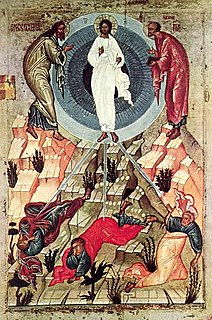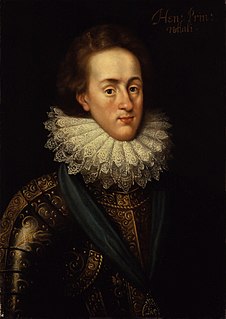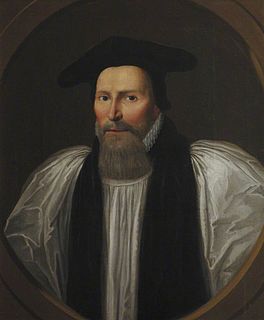Related Research Articles

Bernard of Clairvaux, venerated as Saint Bernard, was a Burgundian abbot and a major leader in the revitalization of Benedictine monasticism through the nascent Cistercian Order.

John Donne was an English poet, scholar, soldier and secretary born into a recusant family, who later became a cleric in the Church of England. Under royal patronage, he was made Dean of St Paul's Cathedral in London (1621–1631). He is considered the preeminent representative of the metaphysical poets. His poetical works are noted for their metaphorical and sensual style and include sonnets, love poems, religious poems, Latin translations, epigrams, elegies, songs, and satires. He is also known for his sermons.

Lancelot Andrewes was an English bishop and scholar, who held high positions in the Church of England during the reigns of Elizabeth I and James I. During the latter's reign, Andrewes served successively as Bishop of Chichester, of Ely, and of Winchester and oversaw the translation of the King James Version of the Bible. In the Church of England he is commemorated on 25 September with a lesser festival.

Thomas Secker was the Archbishop of Canterbury in the Church of England.

A sermon is an oration or lecture by a preacher or other member of religions' clergy. Sermons address a scriptural, theological, or moral topic, usually expounding on a type of belief, law, or behavior within both past and present contexts. Elements of the sermon often include exposition, exhortation, and practical application. The act of delivering a sermon is called preaching. In secular usage, the word sermon may refer, often disparagingly, to a lecture on morals.

Henry Frederick, Prince of Wales, was the eldest son and heir apparent of James VI and I, King of England and Scotland; and his wife Anne of Denmark. His name derives from his grandfathers: Henry Stuart, Lord Darnley; and Frederick II of Denmark. Prince Henry was widely seen as a bright and promising heir to his father's thrones. However, at the age of 18, he predeceased his father when he died of typhoid fever. His younger brother Charles succeeded him as heir apparent to the English, Irish, and Scottish thrones.

In Christianity, Jesus is the Son of God and in mainstream Christian denominations he is the incarnation of God the Son, the second person in the Trinity. He is believed to be the Jewish messiah who is prophesied in the Hebrew Bible, which is called the Old Testament in Christianity. It is believed that through his crucifixion and subsequent resurrection, God offered humans salvation and eternal life, that Jesus died to atone for sin to make humanity right with God.

Henry King was an English poet who served as Bishop of Chichester.

John Buckeridge was an English churchman.

Philip Henry was an English Nonconformist clergyman and diarist. His son Matthew Henry was a notable commentator on the Bible and also a Presbyterian minister.

The Holy Sonnets—also known as the Divine Meditations or Divine Sonnets—are a series of nineteen poems by the English poet John Donne (1572–1631). The sonnets were first published in 1633—two years after Donne's death. They are written predominantly in the style and form prescribed by Renaissance Italian poet Petrarch (1304–1374) in which the sonnet consisted of two quatrains and a sestet. However, several rhythmic and structural patterns as well as the inclusion of couplets are elements influenced by the sonnet form developed by English poet and playwright William Shakespeare (1564–1616).

Robert Bolton was an English clergyman and academic, noted as a preacher.

Edward Reynolds was a bishop of Norwich in the Church of England and an author. He was born in Holyrood parish in Southampton, the son of Augustine (Austin) Reynolds, one of the customers of the city, and his wife, Bridget.

Conceit is a novel by the Canadian author Mary Novik, published in 2007 by Doubleday Canada.
Thomas Falconer (1772–1839) was an English clergyman and classical scholar.
Newcome Cappe, was an English unitarian divine. He served as the pastor of the York Unitarian Chapel, located in York, England. Cappe published various sermons and after his death his second wife, Catharine Cappe published many more.
John Stoughton (1593?–1639) was an English clergyman, of influential millennial views. He was the stepfather and preceptor in their youth of Ralph Cudworth and James Cudworth.
Henry Felton D.D. (1679–1740) was an English clergyman and academic.
George Rust was an English Anglican academic and churchman, who became bishop of Dromore in 1667. He is known as a Cambridge Platonist and associate of Jeremy Taylor.
William Symonds D.D. was an English clergyman, known as a promoter of the Colony of Virginia. The arguments of Symonds in favour of the colony in 1609, equating the British nation with the biblical Abraham, and stating that Native Americans lacked property rights, have been seen as presaging later developments in the colonisation of North America.